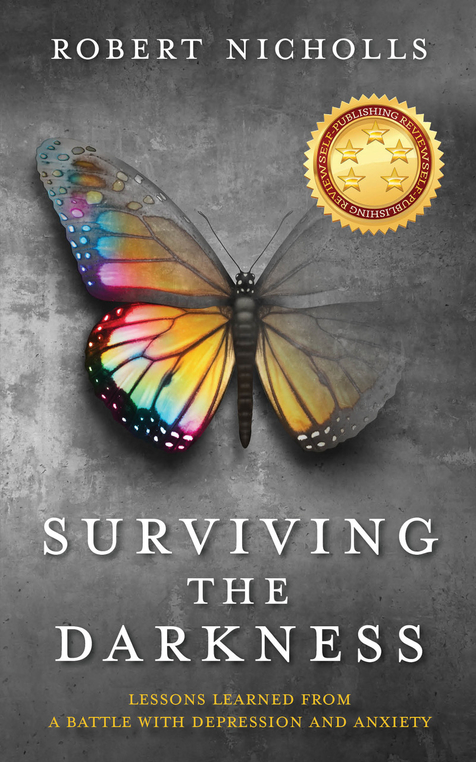
Having recovered from a battle with “the black dog,” as depression is sometimes known, author Robert Nicholls shares the discoveries gained in that difficult process in Surviving the Darkness: Lessons Learned from a Battle with Depression and Anxiety.
Nicholls was a successful business owner, a specialist in business law, and former prosecutor, who had made significant headway in life as a husband, father, and professional. In pursuing his ambitions, he began to neglect all aspects of life except his work – he took less time for recreation, became chronically tired, gained weight, became fearful about social connections, and began to blame himself for failures large and small. He gradually lost interest in sports, music, friendships, and intimate relationships, finding it increasingly difficult to make decisions, and eventually leading to him closing his business. He had thoughts of suicide, and sought medical help.
His path to recovery was slow and involved action on many fronts, which Nicholls details to the reader, offering sound advice. There are many barriers that a depressed person may face, including insufficient professional treatment, social and workplace stigma, and general ignorance leading to misperceptions about the depressed individual, even among family. Standard interventions recommended, with provisos, include antidepressant medications (though the effects vary and each person has to find the right one for his/her particular situation), psychotherapy (noting it is essential to find the right therapist for the individual needs), healthy diet, contact with family and friends, and, most importantly, acknowledging the condition and resolving to be “the driver, not a passenger.”
The overall consensus in the book is that overcoming depression takes time and demands a seriousness of intent. However, given Nicholls’ clear and inspiring prose, these difficulties do not seem insurmountable, even to those who may be currently suffering from depression, but especially for those who may be caring for a person suffering from depression, as sufferers may not entirely have the will to read a book on this subject. But the tone is gentle enough that it can be effective for all readers, given Nicholls’ knowledge and experience.
He carefully developed coping strategies that are stark, but still helpful. For instance, he made a “Miss List” of things he would miss out on if he were to commit suicide. He took inspiration and comfort in his battle from certain sports figures that had overcome great odds in their climb to fame. He pursued exercise and engagement with nature. While realizing that life events continued despite his struggles to overcome his condition, he postponed major decisions that required greater objectivity than he possessed while dealing with depression. Nicholls offers helpful suggestions for caregivers and supporters of those with depression, including things to say (and to avoid saying). Given that he is now on the other side, the book has a real sense of authority, as well as hope.
Nicholls’ writing is concise, thought-provoking, and laden with useful references for carers and sufferers alike. He stresses that his own symptoms were typical, and provides statistical data to help readers recognize their need for help. He refrains from broad detail about his depressive experience in order to keep readers from keying on his problems and feeling even more hopeless about their own, while providing sufficient detail of both his decline and his recovery to offer an abundance of encouragement.
All told, Surviving the Darkness will doubtless be invaluable to anyone who has a diagnosis of depression and anxiety, presenting a realistic portrait of the many possibilities for complete recovery.
Book Links
STAR RATING
Design
Content
Editing
Get an Editorial Review | Get Amazon Sales & Reviews | Get Edited | Get Beta Readers | Enter the SPR Book Awards | Other Marketing Services























Leave A Comment